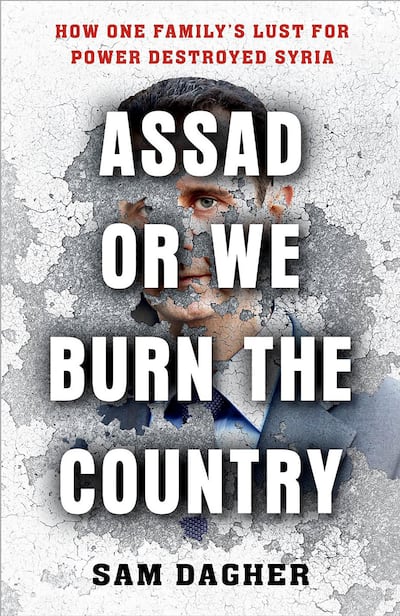When the Wall Street Journal's Sam Dagher arrived in Damascus in 2012, staring him in the face was one of the most difficult reporting assignments imaginable. A veteran Middle East correspondent, Dagher was expected to file articles from under the nose of President Bashar Al Assad as his regime violently cracked down on unruly districts around the country. As one of only a handful of foreign reporters living in the embattled Syrian capital at the time, there were few people with whom Dagher could share a coffee and safely chat about the tumultuous events transpiring all around.
Seven years on, more than half a million Syrians have perished. Millions have fled or been displaced, and geo-political lines have been redrawn. The country is in ruins. From Damascus, Bashar Al Assad has prevailed. So much has happened to Syria since 2011 that any single publication would struggle to cover the breadth of events that have led us to where we are today. In Assad Or We Burn the Country: How One Family's Lust For Power Destroyed Syria, Dagher takes a swing at it and comes very close indeed.

Describing the onset of the 2011 uprising, Dagher's lengthy conversations in Paris with Manaf Tlass, the ex-brigadier general of the feared Republican Guard and confidant of President Al Assad, offer an valuable insight into the regime's plan for dealing with the protesters, a plan that would inform its strategy in the years of war that followed.
In March 2011, Tlass, who defected from the regime in July 2012, reportedly advised Al Assad to throw the intelligence chief in charge of Daraa, where the first protests broke out, in jail and to "sack the governor, go down to Daraa tomorrow and make peace with the people". The governor was indeed fired soon after, but that only served as a foretaste of the regime's broader strategy for dealing with the uprising: deflect, deny and blame.
Having reported from the Syrian capital for five years until February 2012, few of the Syrians I interacted with then ever expected that the regime would stoop so low as to bomb mosques, to torture, starve and gas to death thousands of civilians and drop barrel bombs on rebel-held enclaves. In those days, the capital's working-class suburbs still embraced the hope that the regime would fall. To that end, it's lamentable that readers of Assad Or We Burn The Country are offered little in the way of insights into life on the Syrian streets, or how Damascenes adapted to crushing inflation and security threats. Most of the interviews described in the book are conducted with people outside Syria.
That notwithstanding, Dagher clearly understates his own reporting chops and courage. In Homs in February 2014, he witnesses the savagery perpetuated by pro-regime militias against civilians escaping the besieged Old City of Homs under the protection of a brittle and largely hamstrung UN relief operation.
Because Dagher has spent most of his career reporting on the Middle East, he can deftly describe the sectarian and social milieu that coloured Syrians’ thoughts and actions without having to rely on lazy stereotypes. That allows him to instead turn his pen to portraying the important events at hand. It is this experience that, arguably, saw Dagher report from Homs, Latakia province and elsewhere for almost two years, and get out – alive.
No single reason fully explains why the uprising was defeated and the regime prevailed. That said, some events proved unquestionably significant: the conflict swung in favour of Damascus because Russian warplanes laid siege to opposition districts beginning in late September 2015. Washington refused to engage in a meaningful way with the opposition groups it claimed to back. Opposition politicians based out of Istanbul fiddled as the people they claimed to represent struggled to stay alive. Rebel commanders had become "greedy warlords competing for local control as well as weapons and funds," writes Dagher. Though they had liberated themselves from Assad's rule, they could not escape the feudal mentality the regime had built into the minds of Syrians.
With almost 1,700 endnotes and dozens of interviews, the book is a sprawling, meticulously researched and essential addition to the literature on the Syrian tragedy. It's also a reminder to those in the West pushing for rapprochement with Damascus of what they can expect in return.
Assad Or We Burn The Country is out on May 28


